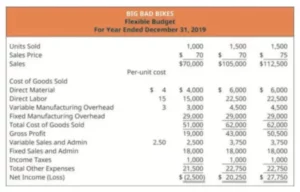Online Bookkeeping Services for Small Businesses Bench Accounting

You’ve used your entrepreneurial prowess to produce a product or service that your customers need. And avoiding spending any money when you think you can just take care of a task yourself is tempting. Proper record-keeping for small businesses makes the process easier and keeps you compliant with the law.

However, accountants are brought in when the business needs more strategic advice, especially as it relates to taxes and corporate or financial planning. Learn more about the differences between accounting and bookkeeping. Some businesses use employment agencies, talent marketplaces, or other platforms to hire, train, manage, and even pay employees and contractors. A small business can connect its bookkeeping system to these third parties for easy data sharing on projects and payments. Now that you’ve balanced your books, you need to take a closer look at what those books mean.
Adjust Entries at the End of Each Accounting Period
Create a new business account, set budget aside for tax, keep your records organised and leave an audit trail. This blog will highlight even more useful bookkeeping tips and terms that you should be aware of. Bookkeeping software and systems should be able to identify potential tax deductions and make any procedure related to reporting and filing taxes as seamless as possible.

US business owners can use cash-based accounting if revenues are less than $5 million, otherwise they must use the accrual method. With many paid and free accounting software options out there, you’re sure to find a bookkeeping solution that will suit your business needs. Start by opening up a checking account, followed by any savings accounts that will help you organize cash flow funds and plan for taxes. For instance, you can set up a savings account and squirrel away a percentage of each payment as your self-employed tax withholding. A good rule of thumb is to put 25% of your income aside, though estimates for high earners might be closer to one-third.
What Does It Cost To Build An Optimized Accounting System
Bookkeeping is the practice of recording and tracking a business’s financial transactions. This includes business expenses, payments, deposits, invoices, receipts, credits, and more. While much of your daily accounting work probably involves paying bills, sending invoices, and recording payments, you also need to keep a close eye on your bank and credit card activity.
- Wave is an ideal accounting software platform for a service-based small business that sends simple invoices and doesn’t need to run payroll.
- A full-time bookkeeper handles the day-to-day accounting functions for your office.
- Finally, imagine approaching your financial institution for a loan or a credit line without having the proper documentation that shows exactly how your business is performing.
However, when you sell online, customers may be located in different cities, states, provinces, and even countries. Business planning is often used to secure funding, but plenty of business owners find writing a plan valuable, even if they never work with an investor. That’s why we put together a free business plan template to help you get started. Any expense that's used partly for personal use and partly for business must reflect that mixed use. For instance, if you have one cellphone, you can deduct the percentage you use the device for business.
Bookkeeping vs. Accounting
In addition to tracking revenue by stream, it’s also important to track revenue by customer. By keeping track of which customers are generating the most revenue, you can focus your marketing efforts. Such as on retaining those customers and attracting is it canceled or cancelled similar ones. Moreover, tracking revenue by customer allows you to identify areas where you can improve your sales strategy. Bookkeeping is one of the most important parts of maintaining a business in order to have success and growth.
Any connections between you, your bank accounts, and Wave are protected by 256-bit SSL encryption. After creating your account, everything is set up so you can get started. Your data is always available, and backed up for extra peace of mind.
What is the role of bookkeeper in business?
A Bookkeeper is a service professional who helps business owners and companies keep track of the money they earn and spend. They prepare your accounts, document daily financial transactions and ensure compliance with applicable standards.